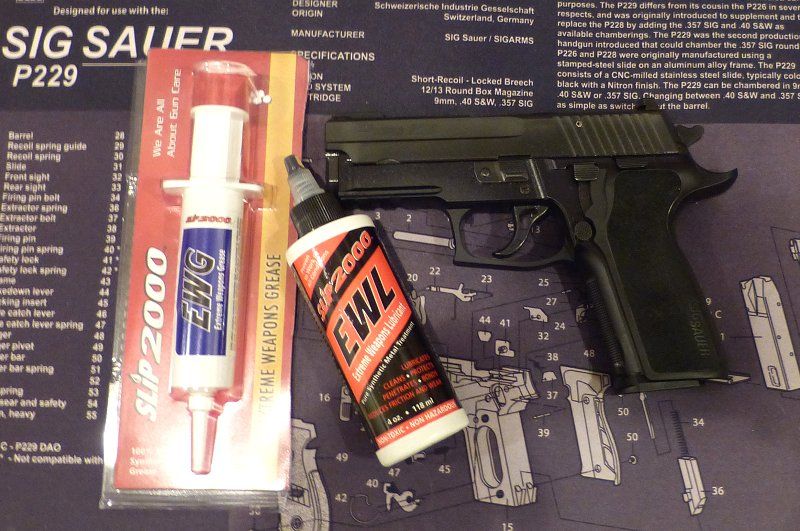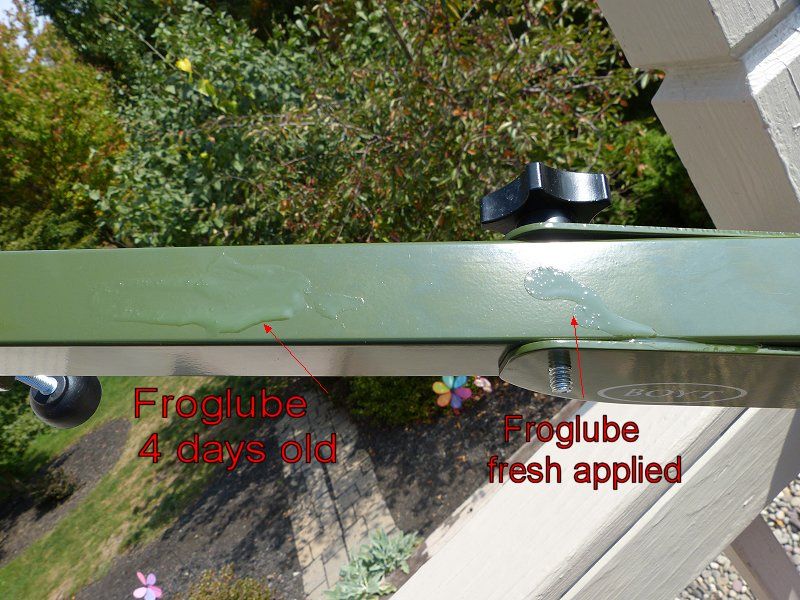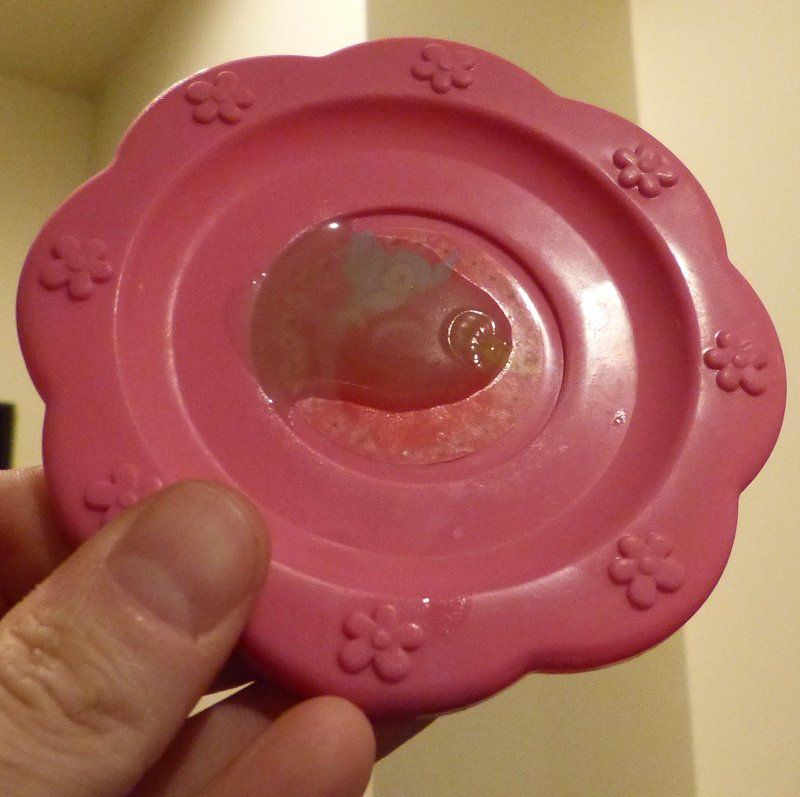As many may know I have been highly recommending Froglube. The Sig Custom shop has Froglube on hand and it is a good product.....BUT.........
I have noticed a issue with using Froglube over the last year. I was very hesitant to post this until I did alot of my own testing. It has come to my attention that excess Froglube over time will get gummy and sticky. This isnt a problem because it is recommended to wipe off all Froglube, as per instructions, after treatment. Here is my issue,.. The problem occurs when treating a entire gun with Froglube. When you heat up the gun and use either the thin or thick version of Froglube, it migrates into your trigger, sear,springs,etc.... This initially is good thing because it protects and lubricates those parts. The problem is that you cant wipe off the excess....See where I am going with this..?? This excess of Froglube over time becomes "sticky" which attracts dirt.
This excess of Froglube over time becomes "sticky" which attracts dirt. ...... I suspected this a month ago after 500 rounds through a few of my guns treated with Froglube. Both my P229's decocker's action would return slow as if treated with maple syrup. My only solution was to use my favorite CLP G96 to remove the Froglube from the internals of my guns. You would have to reapply Froglube all over and then the same stickiness would reoccur. I talked to Froglube directly about this and they said that any stickiness was caused by excess amounts of Froglube still present. So at this point.......It seemed counterproductive to constantly remove a product that would get gummy and sticky in hard to access parts of the gun. This means I could only use Froglube on my barrel and rails and out side of my gun.:huh: I want a system that works together. I started testing with Slip 2000 EWL oil and grease. The EWL is very similar to Froglube that it migrates into the pours of the metal and lubricates and prevents rust. The oil also can be used as a CLP much like Froglube. It is odorless and friendly on all materials. After a few months of using EWL, it has outperformed the Froglube simple by not getting sticky over time. It has migrated into my triggers and after a full tear down, all parts are still lubricated and clean with NO stickness. The difference with EWL is you can leave excess on or apply it and wipe it dry leaving a protective film much the way Froglube is suppose to work and can be used on all parts of the guns internals.
...... I suspected this a month ago after 500 rounds through a few of my guns treated with Froglube. Both my P229's decocker's action would return slow as if treated with maple syrup. My only solution was to use my favorite CLP G96 to remove the Froglube from the internals of my guns. You would have to reapply Froglube all over and then the same stickiness would reoccur. I talked to Froglube directly about this and they said that any stickiness was caused by excess amounts of Froglube still present. So at this point.......It seemed counterproductive to constantly remove a product that would get gummy and sticky in hard to access parts of the gun. This means I could only use Froglube on my barrel and rails and out side of my gun.:huh: I want a system that works together. I started testing with Slip 2000 EWL oil and grease. The EWL is very similar to Froglube that it migrates into the pours of the metal and lubricates and prevents rust. The oil also can be used as a CLP much like Froglube. It is odorless and friendly on all materials. After a few months of using EWL, it has outperformed the Froglube simple by not getting sticky over time. It has migrated into my triggers and after a full tear down, all parts are still lubricated and clean with NO stickness. The difference with EWL is you can leave excess on or apply it and wipe it dry leaving a protective film much the way Froglube is suppose to work and can be used on all parts of the guns internals.
I am pulling my endorsement of Froglube and recommend not getting it into the internals of your gun.
I have already used this system with 7 of my guns that I shoot the most and the results are outstanding. The P938 is lightning fast. I will be switching all of my 27 handguns over to this system over the next month.

I decided to do a experiment after finding some of my many treated guns sluggish and gummy decocker action on my Sig's. I applied a health amount of Froglube on my rifle rest and let it sit for 4 days. Sure enough, the viscosity changed to a thicker syrupy like substance. It wont even run. I then applied a few drops of fresh Froglube and it ran off the metal much thinner with the consistency of baby oil..
So in 4 days the viscosity went from thin baby oil to thick syrup. This is what I thought was happening to the little bit of Froglube that migrates into the gun to places you cant wipe off. I am going to check on this after a week and see how much thicker the Froglube gets. Froglube is a FDA tested product and they say it is safe to eat. Perhaps, like food, it spoils when air gets to it??? This is exactly why my decocker felt like it was in syrup, it was. What is disturbing is when a gun owner doesnt shoot that much and cleans his night stand gun with Froglube.
We all here shoot alot but this could be a major problem to those that dont. What happens to guns that are not shot alot like night stand guns that can sit for months. If the Froglube thickens up, it may cause a malfunction when the gun is needed to shoot especially on tight tolerances or ammo sensitive handguns.

Well thats it...FROGLUBE ='S FAIL
2 hours in the freezer at 20 degrees turns it into wax...... No you are not seeing things, that is my finger print in the Froglube.
Any oil that turns into a waxy substance at only at 20 degrees is garbage.

I have noticed a issue with using Froglube over the last year. I was very hesitant to post this until I did alot of my own testing. It has come to my attention that excess Froglube over time will get gummy and sticky. This isnt a problem because it is recommended to wipe off all Froglube, as per instructions, after treatment. Here is my issue,.. The problem occurs when treating a entire gun with Froglube. When you heat up the gun and use either the thin or thick version of Froglube, it migrates into your trigger, sear,springs,etc.... This initially is good thing because it protects and lubricates those parts. The problem is that you cant wipe off the excess....See where I am going with this..??
I am pulling my endorsement of Froglube and recommend not getting it into the internals of your gun.
I have already used this system with 7 of my guns that I shoot the most and the results are outstanding. The P938 is lightning fast. I will be switching all of my 27 handguns over to this system over the next month.

I decided to do a experiment after finding some of my many treated guns sluggish and gummy decocker action on my Sig's. I applied a health amount of Froglube on my rifle rest and let it sit for 4 days. Sure enough, the viscosity changed to a thicker syrupy like substance. It wont even run. I then applied a few drops of fresh Froglube and it ran off the metal much thinner with the consistency of baby oil..
So in 4 days the viscosity went from thin baby oil to thick syrup. This is what I thought was happening to the little bit of Froglube that migrates into the gun to places you cant wipe off. I am going to check on this after a week and see how much thicker the Froglube gets. Froglube is a FDA tested product and they say it is safe to eat. Perhaps, like food, it spoils when air gets to it??? This is exactly why my decocker felt like it was in syrup, it was. What is disturbing is when a gun owner doesnt shoot that much and cleans his night stand gun with Froglube.
We all here shoot alot but this could be a major problem to those that dont. What happens to guns that are not shot alot like night stand guns that can sit for months. If the Froglube thickens up, it may cause a malfunction when the gun is needed to shoot especially on tight tolerances or ammo sensitive handguns.

Well thats it...FROGLUBE ='S FAIL
2 hours in the freezer at 20 degrees turns it into wax...... No you are not seeing things, that is my finger print in the Froglube.
Any oil that turns into a waxy substance at only at 20 degrees is garbage.

Last edited:
